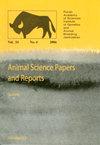Effects of dietary supplementation with algae, sunflower oil, or soybean oil, and age on fat content, fatty acid profile and the expression of related genes in rabbits
IF 1.1
4区 农林科学
Q3 AGRICULTURE, DAIRY & ANIMAL SCIENCE
引用次数: 0
Abstract
>Abstract The aim of this study was determine the effect of different dietary supplements (algae, sunflower oil, or soybean oil) and age (12 and 18 weeks) on the fat content, fatty acid (FA) profile, and expression of the fat mass and obesity associated ( FTO ) and fatty acid binding protein 4 ( FABP4 ) genes in rabbit muscle. Rabbits (n = 160) were randomly divided into four groups. The control group (C) received non-supplemented pellets, while in the other groups the pellet contained 1% algae (A), 3% sunflower oil (OS), or 3% soybean (SO) oil. Soybean and sunflower oil (3%) in the diet increased the linoleic acid (LA) content in meat of 12-week-old rabbits. The use of algae (1%) in the diet increased the n-3 PUFAs eicosapentaenoic acid (EPA) and docosahexaenoic acid (DHA) compared with the vegetable oil and control groups, and decreased the n-6/n-3 ratio. The effect of the diet on FTO and FABP4 gene expression depended on the age of the rabbits. In older animals (18 weeks of age) the expression of these genes was highest in the group with 1% algae. Furthermore, the FA profile and FTO and FABP4 gene expression were affected by the age of rabbits, but not by sex. The results showed that diet is an important tool to modulate the FA profile in rabbit meat by changing the expression of fat metabolism–related genes.饲粮中添加海藻、葵花籽油或大豆油以及年龄对家兔脂肪含量、脂肪酸谱及相关基因表达的影响
摘要本研究旨在研究不同饲粮(藻类、葵花籽油或大豆油)和日龄(12周和18周)对家兔肌肉脂肪含量、脂肪酸(FA)谱以及脂肪量和肥胖相关(FTO)和脂肪酸结合蛋白4 (FABP4)基因表达的影响。160只家兔随机分为4组。对照组(C)给予未添加的微丸,而其他组的微丸中含有1%的藻类(A)、3%的葵花籽油(OS)或3%的大豆油(SO)。饲粮中添加3%的大豆油和葵花籽油可提高12周龄家兔肉中亚油酸(LA)含量。与植物油组和对照组相比,饲粮中添加1%海藻可提高n-3 PUFAs、二十碳五烯酸(EPA)和二十二碳六烯酸(DHA)含量,降低n-6/n-3比值。日粮对FTO和FABP4基因表达的影响与家兔的年龄有关。在年龄较大的动物(18周龄)中,这些基因的表达在含有1%藻类的组中最高。此外,FA谱及FTO和FABP4基因的表达受年龄的影响,而不受性别的影响。结果表明,饲粮是通过改变脂肪代谢相关基因的表达来调节兔肉中FA谱的重要工具。
本文章由计算机程序翻译,如有差异,请以英文原文为准。
求助全文
约1分钟内获得全文
求助全文
来源期刊

Animal Science Papers and Reports
生物-奶制品与动物科学
CiteScore
1.60
自引率
40.00%
发文量
0
审稿时长
>12 weeks
期刊介绍:
ANIMAL SCIENCE PAPERS AND REPORTS (Anim. Sci. Pap. Rep.) is an English language quarterly published by the Institute of Genetics and Animal Breeding of the Polish Academy of Sciences, Jastrzębiec. Papers are welcome reporting studies in all aspects of animal breeding and genetics, reproduction, animal biotechnology, physiology, ethology and welfare. Critical review papers and short reports will also be considered and in justified cases also other original articles dealing with animal science and production.
 求助内容:
求助内容: 应助结果提醒方式:
应助结果提醒方式:


